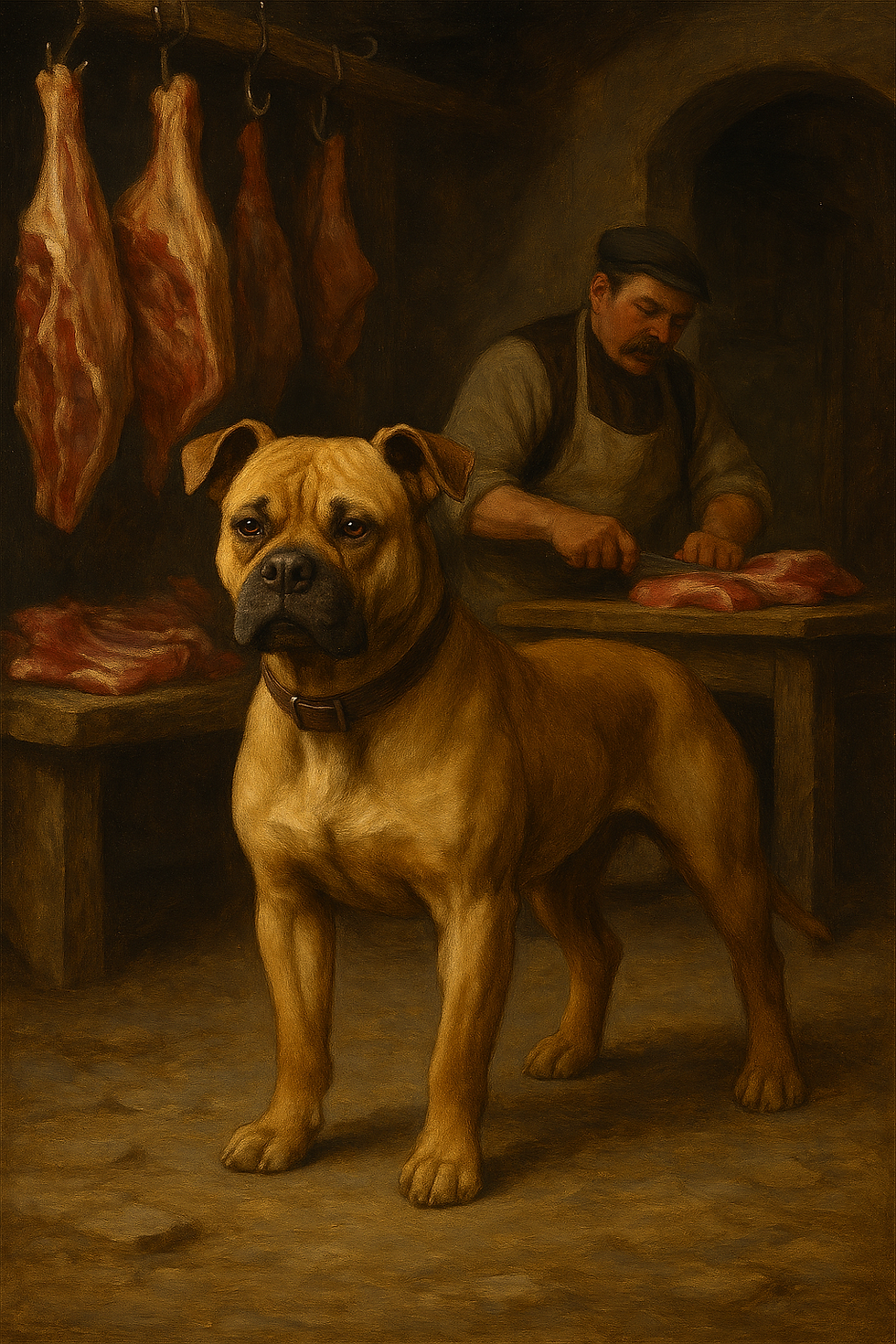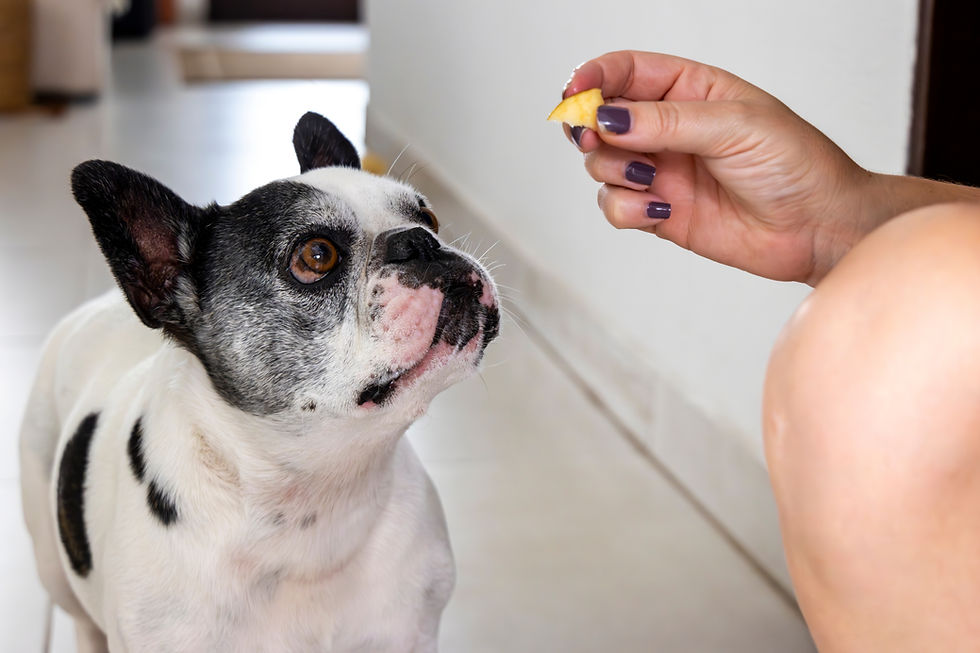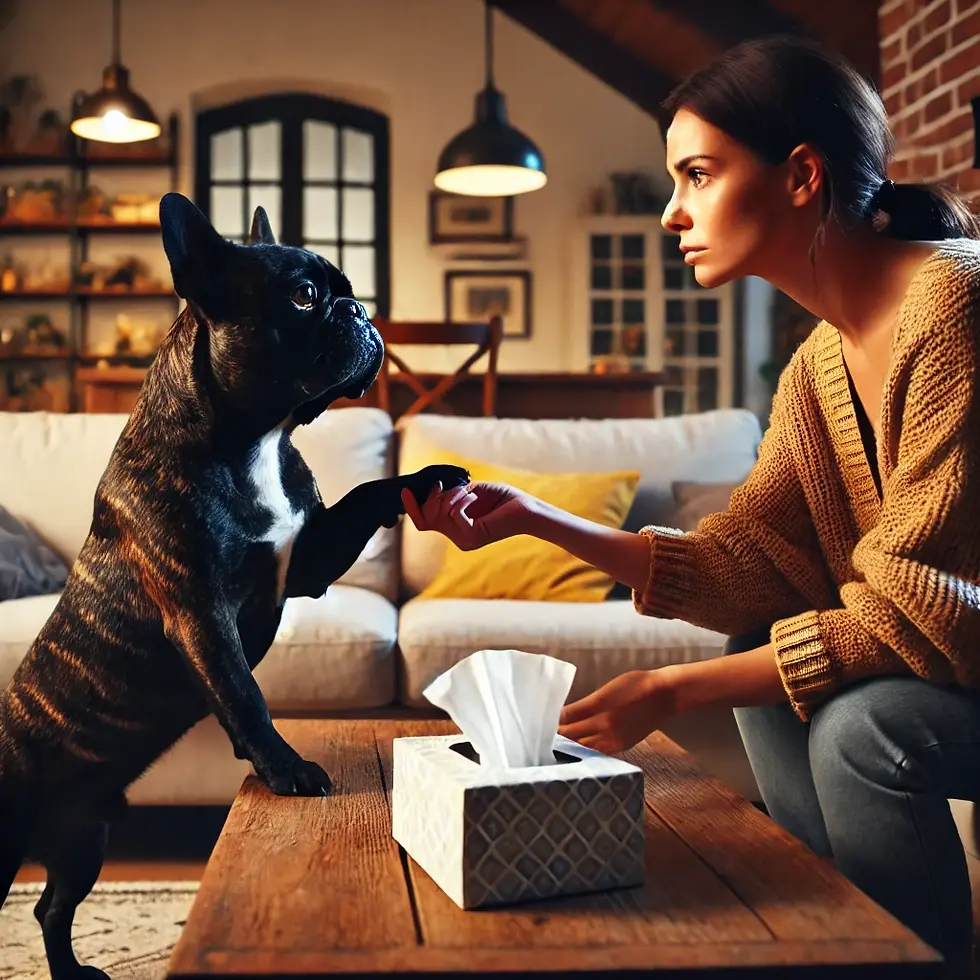Why Is My French Bulldog So Stubborn? 🐶 The Surprising History Behind Their Behaviour
- heathergi85
- May 11
- 4 min read
Updated: May 20
If you think your Frenchie is being difficult on purpose, you're not alone.
French Bulldog behaviour problems are a hot topic in training circles, and many owners find themselves locked in a daily negotiation over basic commands. But here's the plot twist: your dog's stubbornness? It’s practically in their DNA.
👉 Let’s dig into where Frenchies really came from - and how knowing their roots can transform the way you train them.
From Butcher's Dog to Instagram Icon: A Brief History

While today's French Bulldog looks more like a squishy teddy bear than a working dog, their ancestors were tough little helpers in English butcher shops. These were the so-called butcher’s bulldogs - a more compact, agile version of the old bull-baiting bulldogs, bred not for the pit but for utility and control in chaotic, high-stimulation environments.
Their jobs included:
Guarding meat and livestock
Keeping vermin at bay
Moving animals and managing escapees
They needed to be:
Alert to sudden movement
Responsive to noise and scent
Brave enough to confront threats
🐾 Naturally hypervigilant, they were always scanning for changes that might signal danger - or opportunity.
Then came the terrier crosses - shrinking their size but boosting their sass. What you get is an independent, spirited dog with a deep-rooted work ethic… just not always one that wants to fetch your slippers.
Eventually, they made their way to France with lace workers and were refined into the companion-focused breed we know today.
This shift toward lapdog living also reinforced their deep attachment to people - laying the foundation for the ‘velcro Frenchie’ who wants to be glued to your side 24/7. 🐾
But don’t let the size fool you - the legacy of the butcher’s bulldog is alive and well. And while they’ve been bred for companionship, many modern Frenchies still display these inherited behaviours.
Although they’ve swapped the butcher’s block for a sofa, Frenchies haven’t had their instincts turned off. Breeding hasn’t always focused on emotional stability or toning down working traits—so alertness, stubbornness, and reactivity are still very much part of the package.
Breed-Specific Traits That Influence Behaviour Today
Let’s break it down:
1. Stubborn Streaks
Descended from dogs bred to work independently in chaotic butcher shops
Terrier genetics = that classic, “What’s in it for me?” training resistance
2. Hypervigilance and Environmental Sensitivity
Historically on high alert for intruders, vermin, or livestock
Learned to react first, think later
Shows up today as:
Barking at sudden noises
Resisting handling
Overreacting to unpredictable environments
3. People-Oriented but Selectively Obedient
Worked with humans, not under them
Motivated by connection and purpose, not blind obedience
That side-eye when you ask them to sit? It's history speaking.
What This Means for Training 🦴 (Hint: It’s Not You, It’s History)
Reward-based trainers often face the question: "Can you train a French Bulldog not to bite or ignore commands?" The answer is a confident yes - but you’ll need the right approach.
1. Use Positive Reinforcement - And Mean It
French Bulldogs respond brilliantly to reward-based methods
Think treats, praise, toys - whatever makes their ears perk up
Don’t forget: Frenchies are clowns! They love to:
Play 🐾
Pounce
Prance
Put on a show
💡 Tip: A silly voice, quick chase, or rough-and-tumble play can be just as rewarding as food.
Practical Tip: Identify what your Frenchie truly values - liver, cheese, a squeaky toy, or a high-pitched voice? Use that during training - but only for behaviours you want to build.
2. Keep Sessions Short, Predictable and Fun
Frenchies get bored fast - but they also overwhelm easily.Too much stimulation = stubborn shutdown.
💡 Try This: Break training into three parts:
1️⃣ 1 minute warm-up (a known skill)
2️⃣ 2–3 minutes learning a new skill
3️⃣ 1 minute of a fun wind-down
3. Redirect Hypervigilance Through 'Work'
Got a barker? A shadow chaser?
💡 Try This:
Use:
Scatter feeding
Snuffle mats
Basic scent games
These focus that busy brain into problem-solving mode, not panic mode.
4. Build Compliance Through Trust, Not Control
Frenchies don’t follow orders - they assess them.
Analogy: Training a Frenchie is like working with a witty co-worker.
🎯 Give them a clear task
🎯 Explain why it matters
🎯 Keep it light
Try to micromanage? They’ll ghost you.
💡 Try This: Start with easy wins they know how to do. Build confidence and reduce resistance.
Training Challenges Are a Feature, Not a Flaw 🧠
Understanding your Frenchie’s background helps you swap frustration for fascination.
You're not dealing with a “bad dog” - you’re working with centuries of purposeful breeding.
So next time your Frenchie ignores your recall at the park, remember: Their great-great-great-granddad was outsmarting bulls and butchers.
You’ve got this.

Final Thought 💭
Your Frenchie isn’t being difficult - they’re being them. Understanding where they come from is the first step to training that works with their instincts, not against them.
💌 Need a hand with your own loveable little renegade?
If your Frenchie’s behaviour feels like more than you can manage, positive, breed-informed training can make a world of difference.
👉 Get in touch - we’ll work with their instincts, not against them.
_edited_j.jpg)





Comments